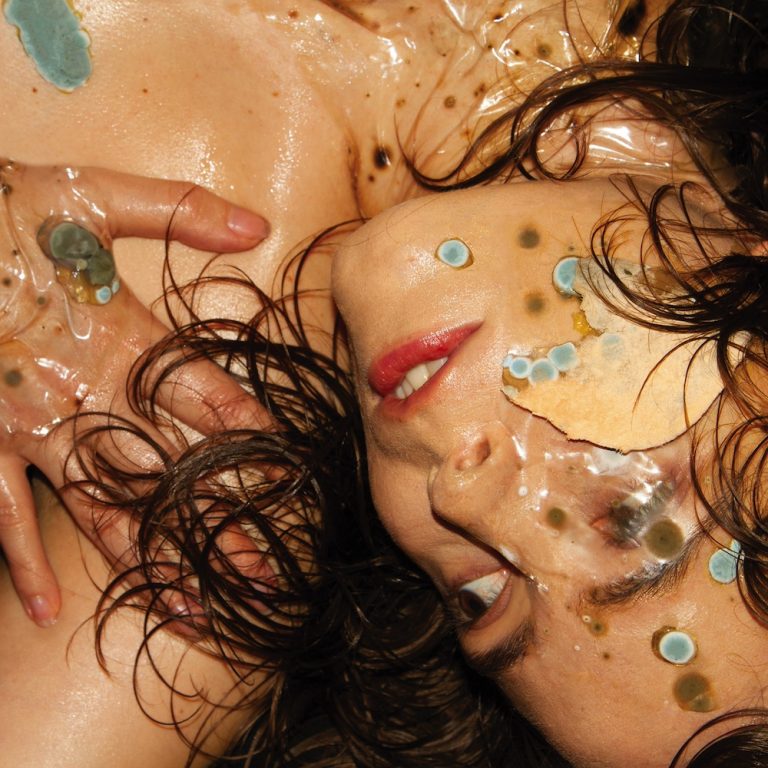If Kee Avil‘s debut album Crease sounded like some chthonic beast unearthing itself from the ground, then its follow-up Spine is more akin to an alien assimilating into the human world. Across the album’s 10 tracks, Vicky Mettler (aka Kee Avil) wades through emotions like she’s reflecting on them in real time, processing heartache and confusion through fragmented lyrics and guitar chords that teeter off balance. “Was I living at all?”, she questions midway through the album; “Am I doing it all wrong?”, she ponders on the final track. Mettler’s thoughts and observations dart like eyes in search of meaning, trying to tie memories of human interactions together.
This new soundworld is by a certain design too. Instead of the three years it took to construct her debut, Spine came about in a matter of months. Though its tempos are slow and fidgety, it spills out like magma engulfing a landscape. It’s also notably more stripped back. This time round Mettler restricted herself: each track deliberately only has four elements – guitar, electronics, and two other instruments.
Working with these limitations, Spine boasts less theatrics and range than its predecessor, but does come off as a more cohesive whole. Its percussion and effects rattle and flutter like the industrial backdrops on Scott Walker’s Tilt or some amalgamation of Björk-ian effects from the past few decades, while Mettler’s voice goes from Billie Eilish-like ASMR to the scorned yearning of a fallen angel. At one point the music can drop into sudden silence and in a moment’s notice it can unleash a wave of distortion akin to a swarm of angry wasps hovering above a primordial geyser. This is a producer’s album in many ways, the mixing of the detail to be admired more than the music at points. (On the release of Spine, Mettler credited her fellow co-producer Zach Scholes for their contributions to the album.) The downside is that less sticks out and the album’s high points feel attached to just how memorable Mettler’s iterations of repeated phrases are.
Spine feels much more pointed than Crease though, which is something that works in its favour. The album sounds like Mettler is creating with a very specific person in mind for her stifled ire and regret. Over a thrum of guitar on “do this again” she exasperates “you swore we’d never do this again” before driving a nail into the coffin; “And you lied,” she shoots in addendum. With a selection of poetic images to capture a feeling of inflicted emptiness (“Like a puppet with no strings… a reptile with no limbs… a diary with no words… a preacher with no voice”) on the album’s strongest cut, “Gelatin”, she unpacks an unhealthy relationship dynamic. “Repairing you / Destroying me,” she repeats over and over, her voice rising up a semitone with each utterance as her indignation simmers.
Although Mettler is all about detail (listen to the way each guitar note ripples with intention, or how each twitch of the drum machine flutters with purpose), she keeps the listener at arm’s length in regards to the particulars of her song’s meanings. “at his hands” alludes to a sadder, darker origin (“There’s no way to say I’m sorry / for what you’ve been through at his hands”) but Mettler gives little away. With her vocals mixed up front, the effect can be disorientating; the listener is invited to lean in like they are hearing a whispered secret only to be spoken to in vague riddles. On “Fading” she recalls “eating sweet clouds / tasting nothing” over marble-like percussion as she directly processes a previous entanglement. In the song’s final moments a flash of clarity appears, a memory suddenly coming to the surface before it disappears just as quickly. Though each syllable is undoubtedly considered, Mettler does capture an improvisatory delivery in her words, singing like she is forming ideas and images in her head as the tape is recording.
If something feels missing from Spine, then consider it absent of a few pieces. The music itches, pulses, and gurns like it’s stretching out a new skin suit; it sounds like Mettler would serve these songs best on stage, writhing and croaking from the back of her throat as the songs form in and around her in front of an audience. (The videos for “Felt” and “Gelatin” capture this dysmorphic imagery pretty well.) The album artwork also feels like an important image to keep in mind. Covered in mould (created by Jacqueline Beaumont and captured by photographer Fatine-Violette Sabiri) the bacteria serves as a telling visual representation of the sometimes deadly and sometimes beautiful but benign things that can grow inside and around us without us realising.
This seems fitting with how Mettler describes the album too, referring to it as “a discovery.” “It simplified lots of things, and I’m still figuring out the questions that came with it, and in the end, it’s left me excited to make more music, dig deeper.” Calling Spine something of a transitory record seems appropriate then, a self-imposed confined space for Mettler to wrangle with and try to make sense of ideas and voices in her head. On “showed you” she sings of how she “want[s] to blow it up just to see / what’s really inside staring back at me”, and it captures this desire for self-examination across Spine pretty succinctly. Mettler is an experimental artist with a fountain of fascinating ink waiting to spill out of her, but right now she’s still finding the correct writing implement to use, be it a worn out nib or the sharpened quill of a feather.

